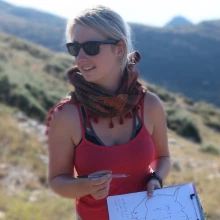SBS Summer Fellowship for Juhasz

Congratulations to Ph.D. candidate Julia Juhasz, who has been awarded an SBS Summer Dissertation Fellowship for her project titled “The Materiality of Time: Using ancient Greek theaters to reframe the value of archeological sites as living cultural heritage space.”
Abstract: My doctoral research project examines the function of archaeological sites as living cultural heritage, focusing on the modern use of ancient Greek theaters. Several stone theaters in Greece have been resurrected as theatrical and musical performance spaces, serving the same function that they were initially constructed for over 2,500 years ago. This practice is unique in contemporary Western culture, which privileges the value of physically conserving built heritage over the social values associated with use. Western values and practices are deeply embedded in the international framework of policy, management, and discourse around cultural heritage. This framework creates a top-down global structure wherein local or marginalized communities' claims to culturally significant objects, spaces, and practices are subsumed entirely by national and international interests. Despite this, local communities and NGOs in Greece are leading efforts to excavate, conserve, and use ancient theaters in connection with the natural and social environment around them.
My project deconstructs and analyzes the policies, practices, and discourse of the dominant international cultural heritage framework which shapes the treatment and conceptualization of archaeological heritage space; examines how ancient Greek theaters function as living cultural heritage within, and often in spite of, this framework; and, informed by and in collaboration with local communities, aims to develop an alternative model for the management of Greek theaters that places the local community at the center and which reflects the personal connections and priorities of the living culture. I draw on cosmopolitan and community-based approaches to archaeology and heritage; this approach is part of the growing body of critical cultural heritage work which integrates ethnographic perspectives into archaeological studies of heritage to understand the relationship between living communities, culturally significant objects and spaces, and narratives about the past. Ancient Greek architecture is woven into modern Western identity and the international cultural heritage framework, so applying decolonizing methodologies to these spaces is an important step in uprooting the embedded Western values in archaeology and heritage work.

